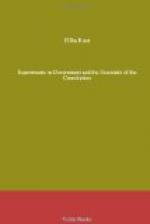But it is not necessary to violate the rules of action which we have established for ourselves in the constitution in order to deal by law with the new conditions of the time, for these rules of action are themselves subject to popular control. If the rules are so stated that they are thought to prevent the doing of something which is not contrary to the principles of liberty but demanded by them, the true remedy is to be found in reconsidering what the rules ought to be and, if need be, in restating them so that they will give more complete effect to the principles they are designed to enforce. If, as I believe, there ought to be in my own state, for example, a Workman’s Compensation Act to supersede the present unsatisfactory system of accident litigation, and if the constitution forbids such a law—which I very much doubt—the true remedy is not to cast to the winds all systematic self-restraint and to inaugurate a new system of doing whatever we please whenever we please, unrestrained by declared rules of conduct; but it is to follow the orderly and ordinary method of amending the constitution so that the rule protecting the right to property shall not be so broadly stated as to prevent legislation which the principle underlying the rule demands.
The difference between the proposed practice of overriding the constitution by a vote and amending the constitution is vital. It is the difference between breaking a rule and making a rule; between acting without any rule in a particular case and determining what ought to be the rule of action applicable to all cases.
Our legislatures frequently try to evade constitutional provisions, and doubtless popular majorities seeking specific objects would vote the same way, but set the same people to consider what the fundamental law ought to be, and confront them with the question whether they will abandon in general the principles and the practical rules of conduct according to principles, upon which our government rests, and they will instantly refuse. While their minds are consciously and avowedly addressed to that subject they will stand firm for the general rules that will protect them and their children against oppression and usurpation, and they will change those rules only if need be to make them enforce more perfectly the principles which underlie them.
Communities, like individuals, will declare for what they believe to be just and right; but communities, like individuals, can be led away from their principles step by step under the temptations of specific desires and supposed expediencies until the principles are a dead letter and allegiance to them is a mere sham.
And that is the way in which popular governments lose their vitality and perish.
The Roman consuls derived their power from the people and were responsible to the people; but Rome went on pretending that the emperors and their servants were consuls long after the Praetorians were the only source of power and the only power exercised was that of irresponsible despotism.




